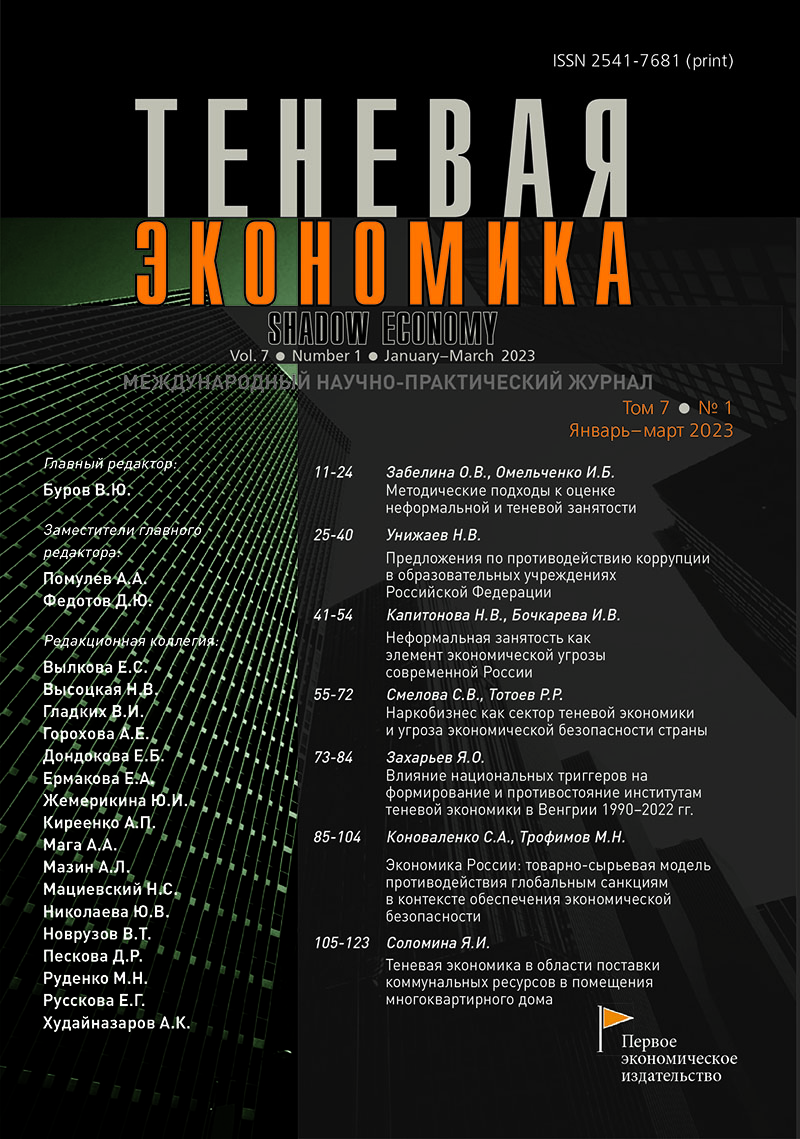Методические подходы к оценке неформальной и теневой занятости
- Авторы: Забелина О.В.1, Омельченко И.Б.1
-
Учреждения:
- Всероссийский научно-исследовательский институт труда Министерства труда и социальной защиты Российской Федерации
- Выпуск: Том 7, № 1 (2023)
- Страницы: 11-24
- Раздел: Статьи
- URL: https://journals.eco-vector.com/2541-7681/article/view/606657
- DOI: https://doi.org/10.18334/tek.7.1.117395
- ID: 606657
Цитировать
Полный текст
Аннотация
Актуальность исследования определяется усилением риска неформальности и ростом потенциала теневой занятости в России и ее регионах в период постпандемийного восстановления рынка труда, что создает новые вызовы государственной политике занятости. В данной статье авторы исследуют отличия дефиниций занятости в неформальном секторе, неформальной и теневой занятости как объектов государственной политики; представляют критический обзор ряда методических подходов к оценке неформальной занятости (через сопоставление доходов и расходов, через валовую добавленную стоимость, эконометрические подходы с использованием данных официальной статистики или результатов соцопросов); предлагают авторские методические подходы к оценке потенциала теневой занятости и определению для российских регионов целевых показателей снижения численности граждан в теневой занятости. Результаты исследования авторов могут быть использованы в рамках реализации политики формализации труда и легализации трудовых отношений в России и ее регионах для выработки целевых ориентиров в виде показателей оценки результативности усилий межведомственных структур по борьбе с теневой занятостью
Об авторах
Ольга Викторовна Забелина
Всероссийский научно-исследовательский институт труда Министерства труда и социальной защиты Российской Федерации
Email: Zabelina_OV@vcot.info
Начальник отдела рынка труда Центра изучения трудовых отношений и рынка труда, доктор экономических наук, профессор
Ирина Борисовна Омельченко
Всероссийский научно-исследовательский институт труда Министерства труда и социальной защиты Российской Федерации
Email: Irina-om@vcot.info
Директор Центра изучения трудовых отношений и рынка труда, кандидат экономических наук
Список литературы
- Guidelinesconcerningastatisticaldefinitionofinformalemployment, endorsed by the Seventeenth International Conference of Labour Statisticians (November-December 2003); in: Seventeenth International Conference of Labour Statisticians (Geneva, 24 November - 3 December 2003), Report of the Conference; Doc. ICLS/17/2003/R [Электронныйресурс] // InternationalLabourOffice. – 2003. -URL:http://www.ilo.org/wcmsp5/groups/public/---dgreports/stat/documents/normativeinstrument/wcms_087622.pdf(датаобращения 30.11.2022)
- Методологические положения по измерению занятости в неформальном секторе экономики. Федеральная Служба Государственной Статистики (Росстат). [Электронный ресурс]. URL: https://www.gks.ru/bgd/free/b99_10/isswww.exe/stg/d030/i030150r.htm (дата обращения: 30.11.2022).
- Капитонова Н.В., Капитонова А.А. Тенденции развития теневой экономики современной России // Теневая экономика. – 2021. – № 1. – c. 9-18. – doi: 10.18334/tek.5.1.111962.
- Кубишин Е.С. Неформальная занятость в России: причины, влияние на экономику и общество, перспективы легализации в пост-коронакризисный период // Economics. Yesterday. Today and tomorrow. – 2020. – № 10. – c. 66-81.
- Karpushkina A.V., Danilova I.V., Voronina S.V., Savelieva I.P. Assessing the Impact of Employment in the Informal Sector of the Economy on Labor Market Development // Sustainability. – 2021. – № 13. – p. 8435. – doi: 10.3390/ su13158435.
- Hussmanns R. Measuring the informal economy: From employment in the informal sector to informal employment // Policy Integration Department Bureau of Statistics International Labour Office. 2004. – p. 42.
- Ramoni J., Orlandoni G. Assessing the loss due to working in the informal sector in Venezuela // Lecturas de Economía. – 2016. – № 64. – p. 33-58.
- Biryukova S.S., Sinyavskaya O.V., Kareva D.E. Long-term dynamics of informal employment and its relationship with the poverty of the Russian population against the backdrop of the COVID-19 pandemic // Population and Economics. – 2022. – № 6(1). – p. 14-25. – doi: 10.3897/popecon.6.e78235.
- Тумунбаярова Ж.Б., Анциферова М.Д. Неформальная занятость: причины и факторы, определяющие ее уровень // Теневая экономика. – 2018. – № 4. – c. 139-149. – doi: 10.18334/tek.2.4.40935.
- Horvath J., Yang G. Unemployment dynamics and informality in small open economies // European Economic Review. – 2022. – p. 103949. – doi: 10.1016/j.euroecorev.2021.103949.
- Williams C., Gashi A. Evaluating the wage differential between the formal and informal economy: a gender perspective // Journal of Economic Studies. – 2022. – № 4. – p. 735-750. – doi: 10.1108/JES-01-2021-0019.
- Williams C. The informal economy and poverty: evidence and policy review. - Joseph Rowntree Foundation, 2014. – 51 p.
- Swarna N.R., Anjum I., Hamid N.N., Rabbi G.A. Understanding the impact of COVID-19 on the informal sector workers in Bangladesh // PLoS ONE. – 2022. – № 17(3). – p. e0266014. – doi: 10.1371/journal.pone.0266014.
- Five Things to Know about the Informal Economy. International Monetary Fund. [Электронный ресурс]. URL: https://www.imf.org/en/News/Articles/2021/07/28/na-072821-five-things-to-know-about-the-informal-economy (дата обращения: 30.11.2022).
- Alderslade J., Talmage J., Freeman Y. Measuring the informal economy – one neighborhood at a time. - The Brookings Institution Metropolitan Policy Program, 2006. – 36 p.
- Voronina S. The Impact of Reallocation in Informal Employment on Labor Productivity in Russian Regions // Ross. Predprin. – 2016. – № 17. – p. 315–328.
- The Informal Sector and Informal Employment in Indonesia // Asian Development Bank, BPS-Statistics Indonesia. - 2011. - 135 р
- Tansel A., Kan E. The Formal/Informal Employment Earnings GAP: Evidence From Turkey // Turkish Economic Association. – 2012. – № 2012/23. – p. 47.
- Beccaria L., Groisman F. Informality and labour market segmentation: the case of Argentina // CEPAL Review. – 2015. – № 117. – p. 121-136.
- Krstić G., Sanfey P. Earnings inequality and the informal economy: evidence from Serbia // European Bank for Reconstruction and Development. – 2010. – № 114. – p. 23.
Дополнительные файлы









